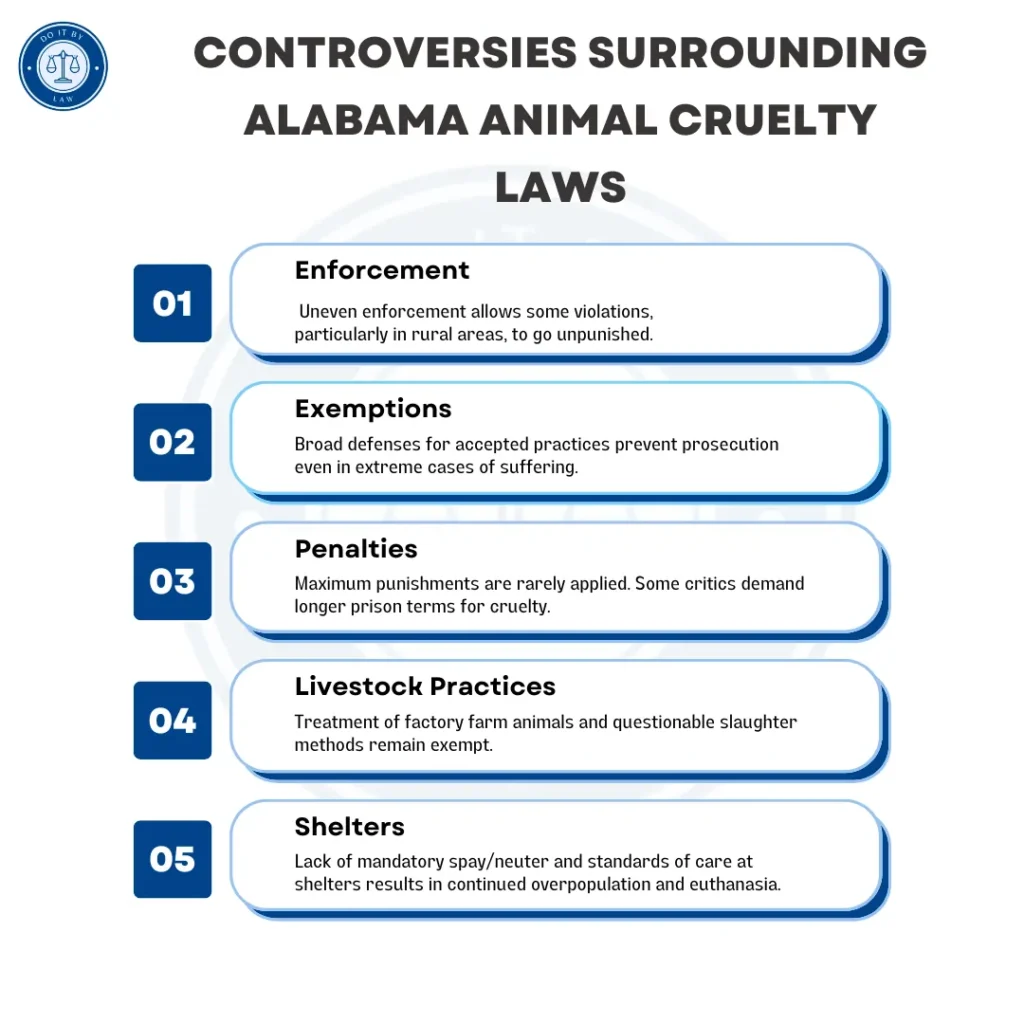Alabama Animal Cruelty Laws: What You Need to Know
Alabama has laws in place to punish cruel, abusive, and neglectful acts toward animals. Understanding the state’s animal cruelty statutes can help residents avoid violations and support reforms where needed. This guide covers Alabama Animal Cruelty Laws provisions, penalties, exemptions, enforcement, and more.
We’ll explore when laws were passed, who and what they cover, what constitutes animal cruelty, punishment options, recent changes, ongoing controversies, and frequently asked questions. Whether you own pets or livestock, work in animal industries, or are an advocate, knowledge of Alabama’s animal welfare rules is important.
When Alabama’s Animal Cruelty Laws Were Enacted and Why
Alabama first enacted anti-cruelty legislation in 1852. Early laws focused on preventing animals from being overloaded, tortured, or deprived of food and drink. Punishments were minor.
Expanded statutes passed in the 1960s-1980s increased penalties and defined animal cruelty more specifically. These laws recognized animal suffering as an issue of broader social concern beyond just protecting property rights.
Alabama’s current animal protection laws continue evolving to balance personal freedoms, animal welfare, accepted hunting/farming practices, and public morality standards. Stopping gratuitous cruelty remains the key objective.
Who Alabama Animal Cruelty Laws Apply To
Alabama’s anti-cruelty statutes apply to any person who owns or has custody of an animal residing temporarily or permanently in the state.
This covers:
- Pet owners
- Livestock owners
- Shelter and rescue operators
- Breeders
- Boarders
- Veterinarians
- Research labs
- Circuses
- Zoos
- Wild animal exhibitors
Anyone responsible for an animal’s care in Alabama must provide proper sustenance, shelter, and medical attention and avoid abuse. Those failing to do so face prosecution.
Key Provisions of Alabama Animal Cruelty Laws
Some key components of Alabama’s animal cruelty laws include:
- Abuse Definition: Overdriving, overloading, depriving of necessities, poisoning, beating, mutilation, killing, and other negligent or malicious mistreatment.
- Animal Fighting: Dogfighting, cockfighting, and causing animals to fight each other is a felony. Attending animal fights is a misdemeanor.
- Abandonment: Deserting an animal in circumstances likely to cause suffering, disability, or death is prohibited.
- Sex Acts: Engaging in or forcing animals into sexual contact is illegal bestiality.
- Sale/Display: Selling or displaying animals in overtly inhumane conditions is prohibited.
- Failure to Provide Care: Not providing adequate food, water, shelter, rest, sanitation, ventilation, space, exercise, medical attention or otherwise neglecting basic needs.
- Hoarding: Keeping large animals in overcrowded, filthy conditions without proper care.
Penalties for Violating Alabama Animal Cruelty Laws
Animal cruelty convictions in Alabama can result in:
- Up to 1 year in jail for misdemeanor cruelty, abuse, or neglect.
- Felony punishments of 1 to 10 years imprisonment for aggravated cruelty, torture, dogfighting, or causing death.
- Fines ranging from $50 to $5,000.
- Mandatory psychological counseling and anger management.
- Forfeiture of abused animals.
- Bans on future animal ownership.
Penalties escalate for repeat offenders. Those with animal cruelty convictions cannot work in animal-related jobs like at veterinary clinics, shelters, or pet stores.
Exemptions and Defenses to Animal Cruelty Charges
Some legal exemptions or defenses for accused animal abusers include:
- Accepted veterinary practices, medical testing, and bona fide scientific research.
- Standard care of livestock and poultry for food production.
- Humane euthanasia at shelters and clinics.
- Legal hunting, fishing, and trapping under-regulated seasons and conditions.
- Harm from legitimate efforts to stop an animal attack or threat to human safety.
- Unintentional neglect due to financial hardship, disability, or hoarding disorder.
- Genuine ignorance of proper animal care practices.
These defenses highlight how Alabama seeks to target intentional cruelty more than accepted practices and unintentional lapses in care.
How Alabama’s Animal Cruelty Laws Are Enforced
A mix of agencies enforce animal welfare statutes in Alabama:
- Local law enforcement investigates abuse reports and makes arrests.
- Animal control officers can pursue charges against owners.
- The Alabama Department of Agriculture monitors large breeding/boarding facilities.
- The Humane Society or SPCA can file complaints and provide evidence.
- Prosecutors ultimately decide whether to pursue criminal charges.
Stiffer penalties in recent years have empowered these agencies to take a tougher stance on serious animal cruelty offenses.
Recent Changes to Alabama’s Animal Cruelty Statutes
Some impactful updates to Alabama’s animal cruelty laws in recent years include:
- The 2016 Pet Protection Act increased penalties for torture, killing, fighting, and bestiality.
- Stricter rules were enacted in 2017 governing shelter practices and commercial dog breeders.
- In 2018, repeat animal cruelty was made a Class C felony punishable up to 10 years imprisonment.
- An Act in 2020 made unlawful possession of fighting animals a felony.
- In 2021, psychological counseling was mandated for certain cruelty offenses.
These stricter statutes reflect evolving social attitudes toward animal mistreatment in Alabama. Lawmakers continue expanding anti-cruelty provisions.
Controversies Surrounding Alabama Animal Cruelty Laws
Despite progress, some areas of debate and controversy persist regarding Alabama’s animal welfare statutes.

- Enforcement: Uneven enforcement allows some violations, particularly in rural areas, to go unpunished.
- Exemptions: Broad defenses for accepted practices prevent prosecution even in extreme cases of suffering.
- Penalties: Maximum punishments are rarely applied. Some critics demand longer prison terms for cruelty.
- Livestock Practices: Treatment of factory farm animals and questionable slaughter methods remain exempt.
- Shelters: Lack of mandatory spay/neuter and standards of care at shelters results in continued overpopulation and euthanasia.
Reforms to address these concerns continue facing resistance. But animal advocates will keep pressure on lawmakers to enact changes.
Conclusion: Key Takeaways on Alabama Animal Cruelty Laws
In summary, the key takeaways on animal cruelty laws in Alabama include:
- Abuse, neglect, torture, and fighting animals are crimes with felony punishments.
- Owners must provide proper care and sustenance for animals.
- Exemptions exist for standard practices like farming, hunting, and research.
- Enforcement involves law enforcement, animal control, agriculture departments, and humane organizations.
- Penalties and felony classifications have expanded over the past decade.
- However, debates continue over improving consistency in enforcement and prosecution.
Understanding your duties and liabilities under Alabama’s animal protection statutes is crucial for all animal owners and handlers within the state. Do your part to report suspected abuse and promote humane treatment.
Frequently Asked Questions About Alabama Animal Cruelty Laws
Conclusion
I hope this detailed overview has provided a helpful summary of Alabama’s animal cruelty laws and protections. Let me know if you have any other questions on reporting abuse, penalties, exemptions, enforcement agencies, recent reforms, or other aspects of Alabama animal welfare policies.







